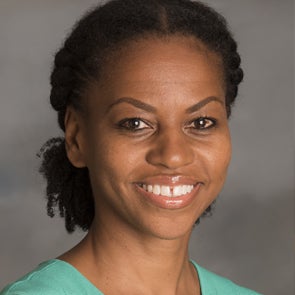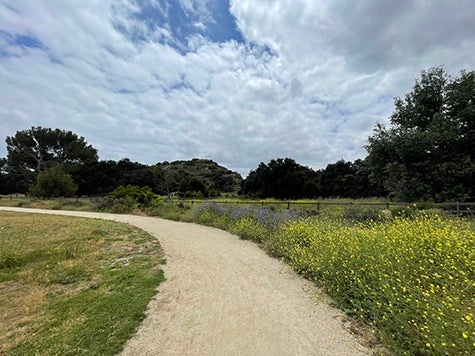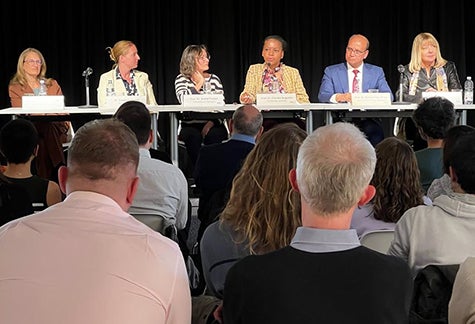Read More: Augustin Named HHD Dean's Fellow for Racial Equity

Frankie Augustin has built a career on discovering and implementing ways to support student success for those who are navigating ways to make their academic dreams come true. She has specialized in working with students who face obstacles including low income status, responsibility for family caregiving, and lack of support as first-generation college students. She volunteers to provide workforce development to incarcerated people to reduce recidivism and to encourage them to be contributing society members. She has always been keenly aware of the role equity—and inequity—play in life’s progress.
“There is a term, ‘Targeted Universalism,’” Augustin said. “It means setting universal goals but targeting the specific needs different people have when looking for ways for them to accomplish those goals.” She referenced a popular graphic that shows people of different sizes and abilities each trying to ride bikes that of uniform size. One rider is comfortable, but for the others, not so much: one person can’t reach the pedals and another is in a wheelchair and would need to pedal using their arms. “Targeted Universalism says that we adapt the equipment to match the person’s needs,” Augustin continued, “In this picture, equality is the idea that everyone has the exact same bike; that’s equal, but it’s not equitable, because people come in different sizes and have different physical needs. Equity is meeting people where they are. It asks the question, ‘what do you need to be successful?’ and then it injects a collaborative intervention where we each come to the table to create a design to meet those needs. We implement the design and then we ask for honest feedback…does it work? where did we miss the mark? Then we take in the feedback to finesse the original design and implement it again. It takes time, patience, innovation, and money in the short run, but in the long run the outcomes are equitable and the society is strengthened.”
Learning More from a Fellowship Opportunity
 Always aware that there is more to learn to create a truly equitable world, in 2022/23, Augustin challenged herself to get out of her comfort zone of 33 years at CSUN and follow a path into a new environment where she could learn from new perspectives.
Always aware that there is more to learn to create a truly equitable world, in 2022/23, Augustin challenged herself to get out of her comfort zone of 33 years at CSUN and follow a path into a new environment where she could learn from new perspectives.
“I was thinking about what I would be doing for the next part of my career,” Augustin said, “I had some experience at CSUN under now-retired Provost Mary Beth Walker when I served as the Equity Faculty Affiliate for CSUN. I enjoyed conversations with faculty, staff, students, and administrators about what equity means to them, and learning about their experiences. I discovered I enjoyed the work!”
So, when Provost Walker told Augustin about the American Council on Education (ACE) Fellows Program, she started thinking about whether to apply. Walker suggested Augustin talk to others who had done the fellowship, so she reached out to those who had, Dr. Markel Quarles at CSU Bakersfield, and Dr. Claudia Petrescu at Kansas State University. Dr. Quarles told her, “If you do the fellowship at least you’ll know whether or not higher ed leadership is something you want to do – don’t decide before you have the experience.” Walker agreed with that assessment, and Augustin decided to lean-in to her adventurous spirit and give it a try.
In a way it was like applying for a job or to graduate school; she gathered letters of recommendation, attended interviews on Zoom and flew across the country as part of the process. When she was accepted into the ACE Fellows Program, she then needed to decide which college she should choose for her fellowship year. “I could have chosen to stay in California,” Augustin said, “But I wanted to be mentored by people who looked like me, and I wanted to see what racial equity looked like in practice on other campuses outside California.”
So, after exploring options at several well-known campuses out-of-state, she heard about a Historically Black College and University (HBCU)* that piqued her interest: Benedict College in Columbia, South Carolina. “It wasn’t an obvious choice for me,” she said. “It’s a small college of 1,700 students in a part of the country I’ve never even visited. So, I took some time to reflect. One day I was in a park, sitting on the grass, when I got the email offering an application to go to Benedict College. Being a believer in God, I prayed first and then I sent my CV to Benedict College.”
Though she admitted concerns about living in the South for a year, she also knew that facing her assumptions about what she would encounter was a key part of her education. “I felt like those were valid assumptions because of history, but the idea that this would be my classroom intrigued me, so I started with a visit,” Augustin said.
Benedict College was established in 1870 at an 80-acre former slave plantation. The College was founded by Bathsheba Benedict, a white abolitionist who purchased the plantation after the Civil War for the purpose of educating newly emancipated, formerly enslaved people. The first class had ten males and the curriculum included grammar and theology and then later included shoemaking, printing, and carpentry. “The curriculum grew over time,” Augustin said. “The first several presidents were white male reverends, then Black male presidents and in 2017, after almost 150 years, they appointed their first female black president, Dr. Roslyn Clark Artis.”
Augustin made the choice to spend her fellowship year with Benedict College for the academic year 2022-23. She packed up her compact SUV and drove to South Carolina. This after serving at CSUN for 33 years. “Once I was accepted as an undergraduate student at CSUN, I never left. South Carolina was a big change. I loved the laid back, southern hospitality culture. The campus contrast was striking; CSUN has so much and most HBCUs get low funding, don’t get endowments, and survive on donor funds. Yet these HBCUs – such a small number of them—graduate the largest numbers of African Americans and have solid retention and graduation rates. Under Artis’ leadership she learned a saying that, “HBCUs are the ones that built the Black middle class.”
Leadership Development
“As I worked on projects for President Artis and attended President’s Cabinet meetings, I learned so much about my own leadership—both style and potential. The fellowship program overall had 46 fellows serving at different campuses nationwide. The ACE Fellows Program would gather the Fellows four times a year for 5-day retreats. Each retreat was like a boot camp,” Augustin said, “We met with former university presidents, explored case studies, dove into higher education budgets and financial management, discussed with legal counsel the current political climate and its negative impact on racial diversity in higher ed, discovered how to leverage strategic enrollment management, and learned how to develop relationships with governing boards, among a host of other things. We also took the Korn Ferry leadership assessment and I learned about hidden talents I had that I once perceived as weaknesses.” These discoveries shifted Augustin’s awareness to enable her to add value from a relaxed perspective, and that has given her more freedom to hear others’ ideas and present content in ways that encourage people to listen.
“I spoke with a White man in South Carolina who was ideologically opposed to my thoughts about politics and race. I wasn’t interested in arguing or creating tension, because I already know that’s the road that leads to nowhere. I wanted to comprehend why he believes what he believes. So I asked him questions about his upbringing and his family. It got interesting; he revealed that he grew up hearing his parents use the “n-word” all the time (he said “n-word” and not the actual word with me). I wanted to hear more so I listened. It’s his story so I won’t reveal the details here. I will say that while I still do not agree with his opinion about racial relations in this country, I left our conversation understanding why he thinks the way he does. By the time we parted, this White man was giving me, a Black woman, advice about which parts of town I should avoid, and telling me to always look White people in the eye when I speak with them. I learned a lot from this interaction."
Gaining and Giving Perspective during College Visits
 Part of the ACE Fellowship requirements, each fellow’s host institution provides a minimum $10,000 professional development budget so the fellow can attend quarterly ACE retreats and participate in structured campus visits. The purpose of visiting other campuses is for fellows to speak with college and university presidents/chancellors, and their senior leadership teams to learn about their career trajectories, listen to their leadership challenges, and hear their advice.
Part of the ACE Fellowship requirements, each fellow’s host institution provides a minimum $10,000 professional development budget so the fellow can attend quarterly ACE retreats and participate in structured campus visits. The purpose of visiting other campuses is for fellows to speak with college and university presidents/chancellors, and their senior leadership teams to learn about their career trajectories, listen to their leadership challenges, and hear their advice.
“I had the opportunity to visit about seven different campuses, including two other HBCUs,” Augustin said. “It was all so enlightening. But I have to say that my favorite college visit was in Germany! I traveled to Tübingen, Germany to visit the University of Tübingen with four other ACE Fellows. I have been wanting to go to Germany and learn more about the steps Germany has taken to confront its role in the Holocaust and investigate how they cultivate a culture of remembrance. I've been interested in this for a while. Germany has taken active measures such as paying reparations, returning Nazi-looted objects, and including Holocaust education in their schools. Even with this progress, I learned that there is push-back from those who insist that they stop talking about the Holocaust.”
Augustin had the good fortune to meet with the new President at the University of Tübingen, Chancellor Karla Pollmann, who became Chancellor in October 2022. “Fun fact,” Augustin said, “she is the first female President in… wait for it… 500 years! Isn’t that something? I was also invited by the University of Tübingen to speak on a panel about racial equity in higher education leadership. It was a thoughtful discussion and at one point, a University administrator stood up and wanted to explore how their University can continue the racial equity and diversity discussion.”
“And how’s this for 6 degrees of separation?” Augustin added, “After the panel ended, an older gentleman introduced himself to me and told me he was retired faculty from the University. He asked me, ‘Guess where I earned my bachelor’s degree? San Fernando Valley State College, 1968!’ In case you didn’t know that was CSUN’s name back in the late 1950s. Who would have known I would be meeting a fellow Matador in Tübingen, Germany?”
Equity for the Formerly Incarcerated
During her fellowship, Augustin also worked with President Artis on a Second Chance Pell program which was a federally funded grant for people who are currently incarcerated. While grants are small, they help subsidize tuition. “I have worked with the incarcerated community before. This is a population that is in my heart.”
Augustin worked with Benedict’s Director for the Second Chance Pell program to start an internal environmental scan by asking faculty, staff, and students about Benedict's Second Chance Pell participation. The data collected showed that students were more likely than faculty and staff to accept formerly incarcerated students on campus. “We realized we had to counter the narrative. The Director and I attended prison education program seminars, consulted with formerly incarcerated people on our campus plan, and invited formerly incarcerated people to Benedict to speak to the campus community."
"We wanted to eliminate the stigma and humanize the people who are incarcerated and formerly incarcerated," she said. "We made a point of using human centered language whenever we referred to incarcerated people, and we politely corrected others who used terms like 'inmates,' 'ex-cons,' or 'prisoners' to raise awareness and understanding. We intentionally used the term 'scholars' or 'Benedict Scholars' whenever we referenced the participants in the Second Chance Pell program. Small changes appeared over time. As word spread about our work, students, faculty, and staff began to visit our office to offer to volunteer. President Artis received a handwritten letter from an incarcerated person who wanted to switch correctional facilities to join Benedict’s Second Chance Pell program. All of it was wonderfully mind-blowing” said Augustin.
The outcome? Faculty at Benedict College started face-to-face classes for incarcerated men in one correctional facility June 2023. "The Director of the program was so motivated by the work we did, she changed her dissertation topic to focus on college going Black males who are incarcerated," Augustin said.
"The Director also created expungement workshops on campus and personally invited the community outside the campus to attend. Expungement is a process where legal counsel can show a formerly incarcerated person how to clear their record of information that can prevent them getting hired by potential employers. Without undergoing this legal process, if the formerly incarcerated person does not disclose the information, they can, and usually do, get fired. As a Fellow in this position,” Augustin said, “I brought in my expertise to support people who look like me, even seeing beyond the barriers of incarceration. Working with President Artis was exactly what I needed to return to CSUN and engage in the discovery process that can allow equity the freedom it deserves.”
Read More: Augustin Named HHD Dean's Fellow for Racial Equity
More About Benedict College and the Fellowship
More About the American Council on Education (ACE) Fellowship
*There is a perception that HBCUs only accept Black students but the designation simply means the college was established during or after emancipation, and it recognizes longevity of the campus and its origins.
F 2023
Jean O'Sullivan with Frankie Augustin
Photos: Augustin, O'Sullivan
